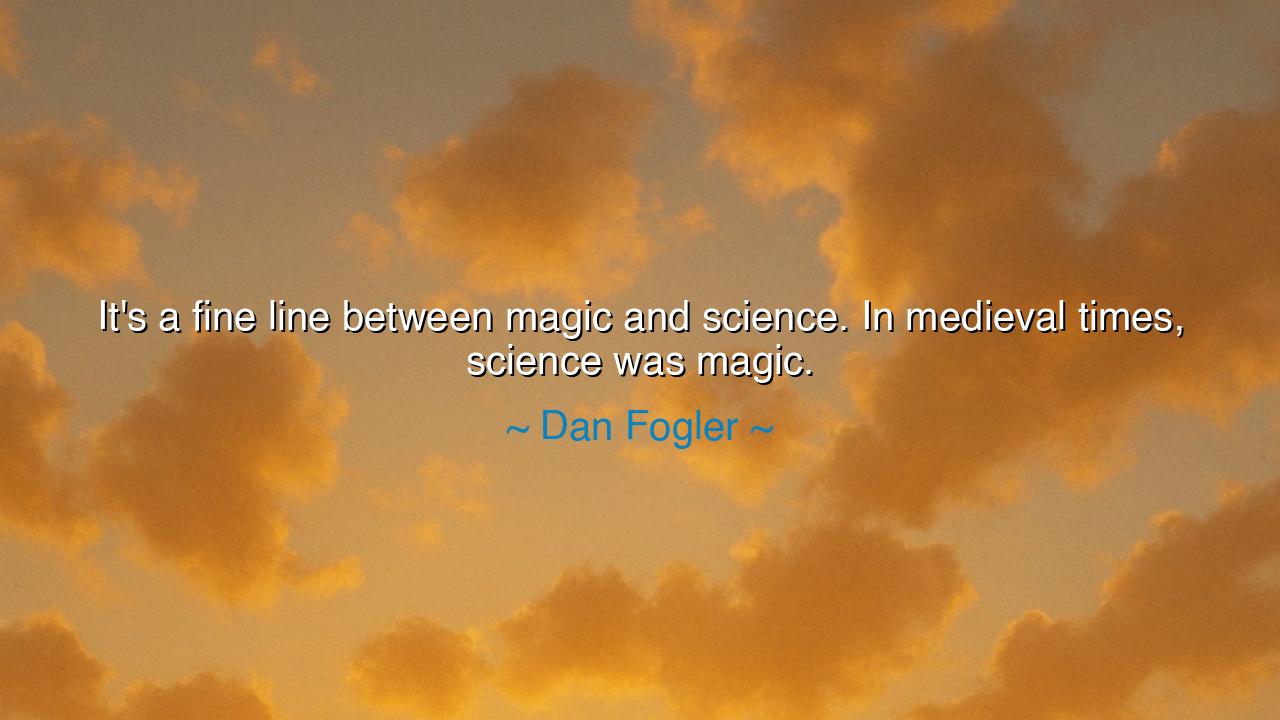
It's a fine line between magic and science. In medieval times






Hear, O children of the earth, for the words of Dan Fogler stir the heart and mind, reminding us of the fine line between magic and science—a line as delicate as a thread spun by the fates themselves. "It's a fine line between magic and science. In medieval times, science was magic." With these words, Fogler calls us to reflect on the nature of knowledge and belief, on how the mysteries of the world that we now call science were once regarded as magic. In the ages long past, when the human mind had yet to unravel the secrets of nature, what we now call science was seen as the domain of the mystic and the alchemist, those who sought to control the unseen forces of the world through rituals and incantations.
Consider the ancient world, O children, where the borders between mysticism and science were as blurred as the edges of a dream. In medieval times, knowledge was not yet separated into neat categories, as it is today. The alchemist, in his quest to turn base metals into gold, was also a scientist—though he did not know the laws of chemistry as we do now, he sought the transmutation of elements, much like the modern chemist. He sought understanding, even though his methods were shrouded in mysticism. To those who looked on in awe, the very act of changing substances seemed like a magical transformation. And in the same way, the wonders of nature that we now understand through scientific principles—the changing of the seasons, the growth of plants, the movement of the stars—were once seen as the workings of higher powers.
The medieval alchemist, much like the great Isaac Newton, sought to unlock the secrets of the universe. But while Newton’s methods became the foundation for modern physics, the alchemist's quest remained bound in the language of symbols and mystical theories. Newton, through his brilliant mind, turned what was once thought to be magic into science, revealing the laws of gravity and motion that govern the heavens. Yet, Newton himself was fascinated by alchemy, and he sought the Philosopher’s Stone, that mythical object believed to grant eternal life and wealth. Fogler's wisdom lies in understanding that what we now call science was, at one time, indistinguishable from magic. The line between the two is not so much drawn in stone, but flows like a river, changing with time and the rise of human understanding.
Think of Galileo, the great astronomer, who turned his telescope to the heavens and found that the earth was not the center of the universe. To the people of his time, his discoveries were not only a threat to the Church but also seemed to reach into the very fabric of the divine order, as if he were revealing secrets meant for the gods alone. His science was so revolutionary, so powerful, that it seemed like magic. It shattered the old beliefs, breaking through the veil of ignorance and revealing a universe governed by laws rather than mystical forces. Yet, Galileo’s discoveries were based on observation and reason, not spells or potions, and they laid the groundwork for a future where science would no longer be viewed as magic, but as the key to unlocking the mysteries of nature.
In the same vein, alchemy evolved into chemistry, astrology into astronomy, and spiritual healing into medicine. Over time, humanity learned to see the patterns in nature, to observe the laws that govern the universe, and to find rational explanations for the phenomena that once seemed magical. But this shift did not happen overnight, nor was it without struggle. Those who embraced science often faced resistance from the priests, the mystics, and the rulers, who saw the rise of rationalism as a threat to their power. Yet, the journey from magic to science was a necessary one—one that required courage, curiosity, and an unwavering belief that truth could be uncovered through reason and observation.
Thus, the lesson Fogler imparts is one of humility and reverence for both science and magic. The great discoveries of the world, the ones that have shaped humanity’s destiny, were once seen as magic. In truth, the desire to understand the mysteries of life, the longing to uncover the unseen, is as ancient as humanity itself. The line between science and magic is not fixed, but fluid—moving with the progress of knowledge. And while we now stand in a world that has uncovered much of nature’s secrets, we must remember that there is still much we do not know, and much that still seems beyond our grasp. Perhaps, one day, what we now understand as science will again be seen as magic by future generations, as they too cross the threshold of new understandings.
O children of the future, the lesson is clear. Do not be quick to dismiss the mysteries of the world as irrational or unscientific, for the very heart of science is the quest to understand what was once thought to be unreachable. Embrace the spirit of inquiry, whether it leads you to the stars above or the hidden depths of the soul. Know that what may seem like magic today may, in time, be understood as science—and that, just as those who came before you bridged the gap between the two, so too shall you. Let your hearts remain open to the wonders of both, for in that balance lies the key to all knowledge.






AAdministratorAdministrator
Welcome, honored guests. Please leave a comment, we will respond soon